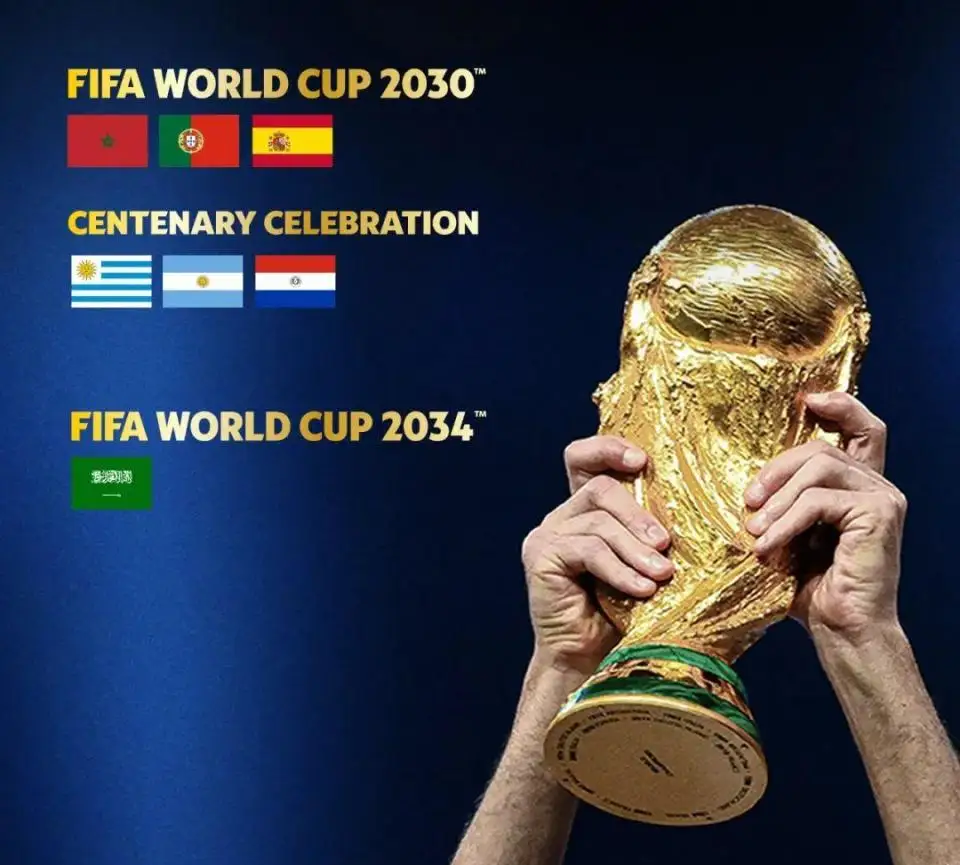On December 11, FIFA officially announced the host nations for the 2030 and 2034 World Cups: the 2030 tournament will span three continents, while the 2034 edition will be held in Saudi Arabia. This decision, however, has been met with little enthusiasm or praise for creativity, as it clearly stems from power and money rather than innovation.
Infantino’s Behind-the-Scenes Deal
In the past, FIFA would organize grand conferences involving all 211 member associations to announce World Cup host nations. This time, however, the decision was made in a virtual meeting, simply confirming plans already decided long ago behind closed doors.
The decision was essentially finalized more than a year ago. On October 4, 2023, the FIFA Council approved a deal orchestrated by Gianni Infantino: the 2030 World Cup would be co-hosted by Spain, Portugal, and Morocco, with South American countries Argentina, Uruguay, and Paraguay each hosting one match. This arrangement ensured that if a vote were held, the combined votes of Europe, Africa, and South America would make any competing bids impossible.
The deal is widely seen as Infantino’s way of rewarding Moroccan Football Federation President Fouzi Lekjaa, a close ally who strongly supported Infantino’s controversial and ultimately abandoned proposal for a biennial World Cup. At the same time, South American nations, aware they could not compete with Spain and Portugal in terms of finances and infrastructure, willingly accepted their token participation. This secured Infantino’s South American vote base, which had been crucial to his rise to power.
Behind all this effort lay an even bigger plan: ensuring Saudi Arabia faced no competition for the 2034 World Cup bid. After Europe, Africa, and South America were included in the 2030 tournament, the 2034 event could only go to Asia or Oceania. FIFA even amended its bidding rules to favor Saudi Arabia, reducing the requirement for compliant stadiums from seven to four, with the rest to be completed later.
The plan gave Saudi Arabia time to follow procedural formalities: submitting a bid, facing no opposition, allowing FIFA to review the proposal in name only, and finally approving it.

Criticism and Protests
Predictably, there were protests. Human rights organizations and women’s football advocates voiced their concerns. On women’s rights alone, Saudi Arabia fares worse than Qatar, which hosted the 2022 World Cup. However, Infantino faced even less resistance on the political front compared to when Russia and Qatar were selected as hosts. As a key ally of the Western world, Saudi Arabia’s domestic policies have rarely been scrutinized by its global partners.
Before the decision was officially announced, some European media criticized FIFA’s disregard for the voices of women’s football advocates, calling the process proof of Infantino’s “autocracy.” Another example of this was the appointment of Noël Le Graët, the former French Football Federation president forced to resign over sexual harassment allegations, as head of FIFA’s Paris office. Le Graët is a staunch Infantino ally and an advocate of the biennial World Cup proposal.
Power Overshadowing Human Values
Whether it’s the few countries like Norway and Denmark that seek to challenge Infantino’s authority or the media aiming to defend football’s spirit, all seem powerless against the omnipotent FIFA president. For instance, Swiss media recently exposed Infantino’s “royal treatment” within FIFA: the organization covers the costs of his luxury residences in Switzerland’s tax haven Zug and Miami, as well as his children’s expensive international school fees. Yet such revelations have no impact on his position.
This situation represents a surreal evolution of FIFA. From its founding by Frenchmen to the era of João Havelange, FIFA’s leadership, though sometimes criticized for collaborating with power (e.g., the 1978 World Cup), still upheld the dream of “great football embracing the world.” Iconic tournaments like the 1982 Spain World Cup, 1986 Mexico World Cup, and 1990 Italy World Cup kept “football” at the center, whether hosted in Europe or the developing world.
When Havelange handed over leadership to his protégé Sepp Blatter, FIFA became highly commercialized while retaining its traditional decision-making mechanisms. This system led to controversies, such as those surrounding the hosting of the World Cup, eventually culminating in the “FIFA Gate” scandal. Russia and Qatar’s successful bids prompted U.S. authorities to take action, resulting in a sweeping crackdown.

Infantino’s Strategy
As Blatter’s successor, Infantino’s approach to FIFA’s post-corruption era has been the opposite of what might be expected. Rather than enhancing transparency and democracy, he has consolidated power. Drawing inspiration from Italian mafia structures, Infantino emphasizes loyalty above all else. His decision-making mechanisms have been sidelined, with World Cup hosting rights turned into personal deals. Without voting, there is no significant controversy. Whatever the media says falls on deaf ears.
Infantino has been remarkably effective. For example, despite widespread criticism of the expanded 2025 FIFA Club World Cup, Infantino secured funding from Saudi Arabia to ensure its viability, even though its broadcasting rights have failed to attract buyers. This reflects a broader concern: football’s market is oversaturated, its schedule too packed, and its appeal to younger generations waning.
Football’s Diminishing Human Value
Football’s global popularity stems from its ability to showcase human value through sport. When completely overshadowed by power and money, this essence fades.
Infantino currently stands at the peak of his power, the most influential figure in football history, with seemingly everything under his control. Yet history teaches us that such moments of absolute dominance are often followed by unforeseen events, both for individuals and for the sport they oversee.









